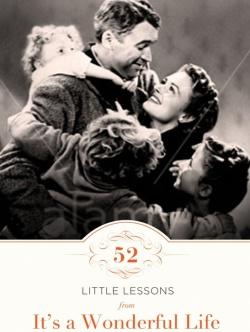If I should accomplish this mission—I mean—might I perhaps win my wings?—Clarence, to Franklin
In my thirty-six years as a journalist, among the things I’ve learned is this: the people who are the most content are the ones helping others. I’ve seen it time and again. In rag-tag hospitals set up in cinder block churches in rural Haiti. In schools where teachers go the extra mile to help kids who aren’t getting much help at home. In the basement of a church that opens its doors to homeless teenagers during the cold winter months.
The people doing this helping were often cut from the same cloth as Clarence the Angel: quiet, unassuming folks whom some might look at as castoffs themselves. Folks not interested in impressing others. Folks with big hearts, gentle spirits, and a thirst to reach out to those who are struggling. And folks who feel as if they’ve been blessed through their experiences.
True, Clarence enters his mission with an ulterior motive: He wants to earn his wings. He wants a reward. But early on, it’s clear that he’s an angel full of compassion, empathy, and hope. And he’s eager to help. In other words, he’s not so focused on the reward that he overlooks that the bottom line here is helping a man. “Splendid!” he says when Franklin informs him that a man down on earth needs help.
When all is said and done, however, Clarence gets more than the wings he so desires. He also gets clarity of vision. At movie’s start, Clarence lacks such vision, given his superior Joseph’s comment to him when he fails to see the town to which he must go. “Oh, I forgot. You haven’t got your wings yet…If you ever get your wings,” the angel tells him, “you’ll see all by yourself.”
That’s exactly what I’ve learned from the hundreds and hundreds of “givers” I’ve interviewed in a world full of takers: They have a clarity on life. They see a truth that the takers—the folks who believe that he who dies with the most toys wins—cannot see. And this clarity is an affirmation of Jesus’ words in Acts 20:35: “It is more blessed to give than to receive.”
The idea is not that we should give to others in order to receive, which, you could argue, is what Clarence is doing. But we should give because God first gave to us, and we’re called to walk in His footsteps. The side benefit of blessing others is being blessed ourselves.
Remember the scene in the bridge tollhouse when George and Clarence are drying off and warming up? Clarence tells George that he has come from heaven and had to jump in the river to save George. “I knew if I were drowning you’d try to save me. And you see, you did, and that’s how I saved you.”
It’s a fascinating dynamic at work here, this idea that helpers are helped themselves by helping. By jumping in, by taking a risk, by trying to save someone else, we are—Clarence suggests—saving ourselves.
But some people never muster the courage to jump. They’re afraid of giving up familiarity for the unknown, afraid of giving up all they have for nothing that, at the moment, they can see.
In Luke 18, a rich ruler asks Jesus what he must do to inherit eternal life. Among other things, Jesus says, “[You must] sell everything you have and give [it] to the poor, and you will have treasure in heaven. Then come, follow me” (v. 22).
Lacking vision, the ruler “became very sad, because he was a man of great wealth” (v. 23). His wealth clouded his ability to see—or trust that he’d someday see—the benefits of leaving behind his materialistic life to help others.
Contrast his reaction to that of the biblical Isaiah, who, when God asks, “Whom shall I send?” says, “Send me!” (Isaiah 6:8). Clarence, clearly, has a touch of Isaiah in him. He was ready to go, never stopping to consider what the risk might be. I mean, let’s face it: he was living in heaven, a pretty cushy existence, right? And yet he was eager, even despite past failures, to go.
In the end, Clarence learns the secret lesson that all true givers learn: that, indeed, it is in giving that we receive. Though we might go into an unknown situation with a fuzzy focus, the risk we take brings us clarity. So the people we try to help wind up helping us.
I once spoke at a banquet involving a nonprofit program whereby adult mentors were matched with kids in rural communities who seemed to be slipping through the cracks, kids who weren’t getting much support at home and needed people to come alongside them and believe in them. This was no small commitment; the adults were expected to commit to three years of mentoring these children who, at first, they only knew as troubled kids.
When one such adult was recognized with an award—in other words, “earned his wings”—he broke down at the podium. “This isn’t fair,” he said. “Why should I be awarded for giving so much to this kid when he gave so much more to me?”
He had experienced that wondrous thing that only those who dare to take a risk can experience: in helping others we help ourselves.




